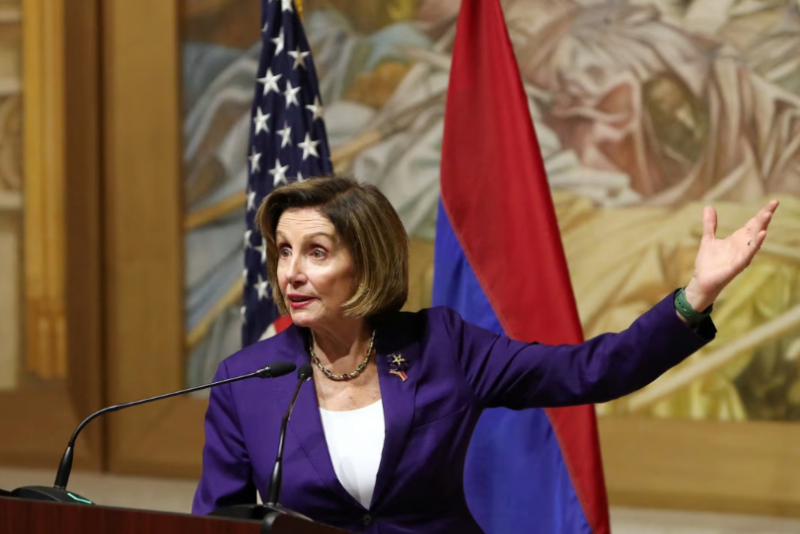
Beijing: During a visit to the ally of Russia, Nancy Pelosi, speaker of the US House of Representatives, strongly denounced what she called "illegal" border attacks by Azerbaijan on Armenia on Sunday.
Pelosi presented her visit to Armenia, a tiny nation the size of Maryland in the US that is sandwiched between Iran, Azerbaijan, Georgia, and Turkey, as an effort to increase support for what she described as a shining example of democracy.
Speaking in the historic city of Yerevan, Pelosi claimed that the "illegal and deadly attacks by Azerbaijan on Armenian territory" that precipitated border clashes that resulted in more than 200 fatalities were the reason for her trip.
Alen Simonyan, the speaker of the Armenian parliament, expressed dissatisfaction last week with the way a military alliance led by Russia responded to Yerevan's call for assistance. Pelosi stood beside him and said, "We strongly condemn those attacks."
Pelosi said it was obvious that the border fighting was started by Azeri attacks on Armenia and that the chronology of the conflict should be made clear. Pelosi angered China with a trip to Taiwan last month.
According to Pelosi, the Azeris "were the ones who started the fighting, and that has to be acknowledged."
Azerbaijan's response to Pelosi's comments was unusually harsh, accusing her of jeopardising the stability of the Caucasus.
The foreign ministry issued a statement saying, "The unfounded and unfair accusations levelled by Pelosi against Azerbaijan are unacceptable.
The ministry referred to Pelosi's comments as "Armenian propaganda" and declared that they were "a serious blow to the efforts to normalise relations between Armenia and Azerbaijan."
Such a clear-cut division of responsibility for the conflict goes beyond what the US State Department has previously stated in the open. Secretary of State Antony Blinken voiced concerns about the fighting and urged restraint, but he made no accusations.
On September 13, shortly after midnight, Azerbaijan reportedly shelled at least six Armenian settlements inside the border, attacking both civilian and military infrastructure with drones and powerful guns. It was unprovoked aggression, according to Yerevan.
They are denied by Azerbaijan, which is supported by Turkey. According to the country, soldiers retaliated when Armenian sabotage units attempted to mine Azeri positions. That story, according to Armenia, is a fabrication by Azeris.
Russia views the Caucasus as its own sphere of influence and chafes at what it perceives as US meddling in the region. Russia has repeatedly denounced Pelosi's visit to Taiwan.

Moscow, however, is preoccupied with the Ukrainian conflict, which has led to the biggest conflict with the West since the Cold War's height.
Russia is a key military ally of Armenia and maintains peacekeepers along the Nagorno-Karabakh contact line, where Armenia and Azerbaijan fought a war in 2020. Russia also has a military base in northern Armenia.
On Friday, Russian President Vladimir Putin asserted that his country had the means to mediate the conflict. An armistice mediated by Russia put an end to the most recent fighting.
But on Tuesday, the Collective Security Treaty Organisation (CSTO), a military alliance of former Soviet republics led by Russia that includes Armenia but excludes Azerbaijan, decided to send a monitoring mission in response to requests for assistance.
The speaker of the Armenian parliament, Simonyan, expressed his displeasure with the response and compared the CSTO to a pistol that did not fire bullets.
Pelosi claimed that Washington was interested in learning about Armenia's defence requirements and that Washington wanted to assist and support Armenia in what she described as a worldwide conflict between democracy and autocracy.
According to Pelosi, "We should be using our influence and leverage to demonstrate that Armenian democracy and sovereignty is a top priority." "The velvet revolution was praised all over the world."
Following anti-government demonstrations known as Armenia's Velvet Revolution, Nikol Pashinyan, the current prime minister of Armenia, came to power in 2018.
Pelosi found it interesting that Armenia was dissatisfied with Russia's response.
We'll see what happens next, but it's interesting that they were disappointed to receive fact-finders rather than protection from that relationship.
Armenia increases police presence before Pelosi's visit capital
Border clashes between Azerbaijan and Armenia have returned after provocation